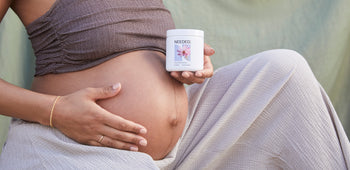So many changes can happen in your body during the postpartum period. Hair loss, night sweats, and baby blues are all common. But that’s not all. Some women also experience postpartum hives. Read on to learn why they happen and what you can do about them.
What are Postpartum Hives?
Postpartum hives are just hives that appear after giving birth. Also called urticaria, hives are itchy, raised bumps on the skin that appear in response to some kind of trigger.
Symptoms of Postpartum Hives
Hives typically show up as a red rash or raised bumps on the skin. They tend to be itchy and turn white when you press on them.
However, postpartum hives don’t always have these characteristics. They may also appear as larger flat bumps on the skin. They can show up anywhere on the body.
Causes of Postpartum Hives
Hives develop on your skin when your body is reacting to something in the environment. During postpartum, your body may react to things that it did not previously.
Postpartum comes with so many changes, and some of the physical, mental, and emotional changes can impact how your body responds to triggers in the environment. Some lifestyle changes that might impact your overall health and immune response include lack of sleep, disrupted sleep, hormone changes, anxiety, stress, and changes in the microbiome.
The following triggers may cause postpartum hives.
Allergies
You might think that you aren’t susceptible to allergies because you didn’t have allergies before pregnancy. But the truth is, pregnancy can affect your gut and immune system and cause changes in things that your body is sensitive to. Common environmental allergens include things like dust, pollen, animal fur, latex, chemicals, dyes, and perfumes or other fragrances.
Infections
Infections from viruses and bacteria - even the common cold - can temporarily impact your immune system. In addition, some women get other types of infections during labor and delivery, like Group B strep that are treated with antibiotics.
Infections and antibiotic use may impact the gut and immune system and lead to postpartum hives and other unusual symptoms.
Sluggish Liver
The role of your liver is to filter toxins and remove other unwanted substances from the blood. It is not common, but in some cases, pregnancy can slow down these detoxification processes and skin rashes can result.
How Long do Postpartum Hives Last?
Postpartum hives typically resolve on their own within a few days or weeks. However, it’s worth reaching out to your healthcare practitioner to explore treatments and potential underlying causes.
How are Postpartum Hives Diagnosed?
Most people are familiar with the appearance of hives, but postpartum hives can be officially diagnosed through a physical exam of your skin.
In addition to a skin evaluation, tests may be performed to identify a root cause. Skin prick tests and blood tests that look for antibodies against specific triggers like food or allergens are most common.
Medical Treatment for Postpartum Hives
You may choose to pursue testing to find a cause of your postpartum hives, but in most cases, you won’t need medical treatment. If your symptoms are interfering with your daily life and ability to care for yourself and your baby, your healthcare provider may suggest or prescribe a medication to use temporarily. Always confirm that whatever you take or apply is safe to use if you’re breastfeeding.
Home Remedies for Postpartum Hives
Home remedies for postpartum hives aim to help alleviate itching and discomfort. A lukewarm bath or application of aloe can help with acute itching. Just be sure that your products don’t contain any synthetic fragrances, as they can further irritate the skin. Wearing loose, breathable clothing can also help keep you comfortable.
When to See Your Doctor About Postpartum Hives
It’s worth sharing that you have postpartum hives with your healthcare provider. They may help you explore what is triggering a reaction.
Get urgent medical care if your postpartum hives are accompanied by other serious allergy symptoms, like difficulty breathing; lightheadedness; or swelling of the face, lips, tongue, mouth, or throat.
Remember taking care of yourself postpartum should be a priority, see our tips from a doula and learn more about our supplements to support your bodies needs in post birth recovery.














